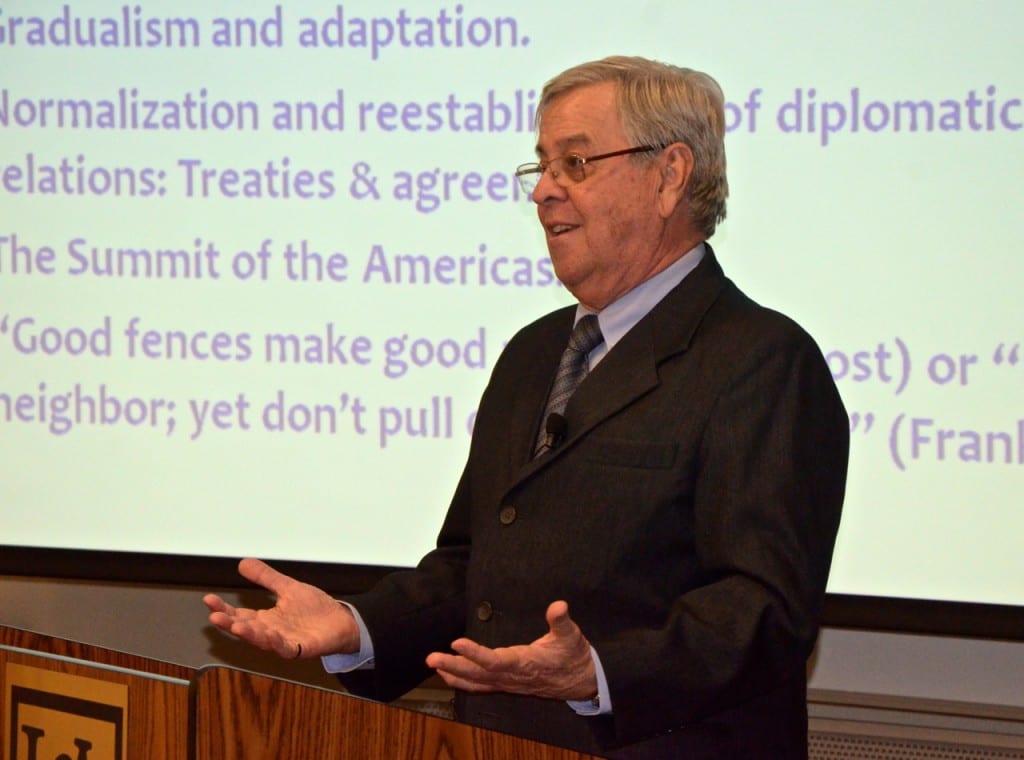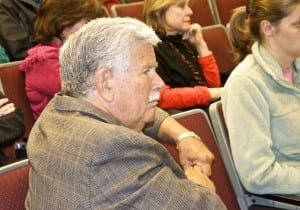
Cuban Ambassador Carlos Alzugaray speaks to the Society Mobile-La Habana at the University of South Alabama: Glynn Wilson
By Glynn Wilson –
MOBILE, Ala. — The United States and Cuba finally have a chance to normalize relations and benefit both countries from the exchange of cultures thanks to the recent announcement by President Barack Obama that the long and tragic trade embargo should be lifted, according to Cuban Ambassador Carlos Alzugaray.
He spoke about U.S.-Cuban relations at the University of South Alabama on Monday, Feb. 23 as a guest of the Society Mobile-La Habana, a sister city organization promoting trade and cultural ties between the two historic cities of Mobile and Havana.
Few may realize it, but the relationship between the two cities goes all the way back to 1850, when Cuban students from Spring Hill College came home with the first baseball bats and balls.
“We play baseball in Cuba because of Spring Hill College,” Mr. Alzugaray said.
Since the president made his historic announcement to restore diplomatic relations with Cuba and called for an end to the Cold War economic embargo that has been in place since the Cuban Missile Crisis in 1961, “The last couple of months have been incredible,” Mr. Alzugaray said.
Back in December just before Mr. Obama made his announcement, there were still discussions going on about the exchange for spies between the two countries and an agreement seemed impossible.
“The funny thing is something happened,” Mr. Alzugaray said. “Our presidents had been talking and the next day we had this wonderful news.”
Mr. Obama and Raul Castro met and shook hands in Africa at Nelson Mandella’s funeral back in 2013, and unbeknownst to anyone, Mr. Alzugaray said, “They had already been negotiating.”
There had been a long history between Cuba and the U.S. going all the way back to 1804. While President Thomas Jefferson was negotiating the Louisiana Purchase with Nepolian of France, he was already talking to James Madison about the need to acquire or control Cuba because of its geographic location between the Eastern Seaboard and the ports of the Gulf of Mexico and Caribbean.
Then came the Spanish-Cuban-American War in the late 19th century, then the failed Bay of Pigs invasion and the Cuban Missle Crisis in the early 1960s, when President John Kennedy had been considering a new relationship with Cuba before he was assassinated in Dallas.
When President Obama made his announcement in December, a number of Republican critics claimed he gave up everything and got nothing in return.
“But that’s not exactly what happened,” Mr. Alzugaray said.
Both countries made concessions by trading imprisoned spies. Cuba even gave up one of its own citizens who had spied for the CIA, which the U.S. refuses to do even in the case of Jonathan Pollard, an American citizen who spied on the U.S. for Israel, a close ally.
The U.S. released three of the infamous Cuban Five who were still in prison in exchange for an unnamed American intelligence agent held by Cuba and American Alan Phillip Gross.
Also, Cuba agreed to President Obama’s wish to begin the normalization process by reestablishing diplomatic relations even without a formal vote in Congress lifting the embargo. That is a precedent that bellies every other experience in American history, including the case of Vietnam and China, when diplomatic ties were reestablished at the end of the process after other treaties had been agreed upon.
“So Cuba made an important concession,” Mr. Alzugaray said.
He made the case that the relationship between the two countries has always been asymmetrical, with the best case in point the U.S. military base in Guantanamo which is on Cuban sovereign territory but controlled by the U.S. without any end point or exit clause in the lease. The lease agreement was originally signed in 1911 and renewed in 1934, and President Obama promised to close the prison there when he ran for office in 2008. Yet it still houses prisoners or so-called terrorists, mainly radical Muslim extremists suspected of plotting against the United States.
There is another famous case when Cuba made concessions to the U.S. and got nothing in return, Mr. Alzugaray said, and that was the case of whistleblower Edward Snowden.
“Edward Snowden wanted to come to Cuba,” Mr. Alzugaray said. Cuban diplomats went to see him, and according to Mr. Alzugaray, they said: “You know Edward, we like what you are doing. Most of what you revealed we knew. The rest we suspected,” he joked. “But you know, don’t come to Cuba. We have enough on our plate to add another problem. Plus, I don’t mind telling you, the Internet connection is terrible. Anyone who goes to Cuba knows that.”
On a more serious note, Mr. Alzugaray said that Raul Castro, who plans to retire in 2018, knows that if a deal is going to be reached between the two countries it is better to make a deal now with Mr. Obama.
“If Jeb Bush or Marco Rubio become president of the United States, then its going to be very difficult to reach any kind of a deal,” Mr. Alzugaray said.
He quoted a professor in North Carolina who argues that the logic of history and geometry make it inevitable that Cuba and the U.S. will eventually have a normal relationship.
“So it’s better to start now,” Mr. Alzugaray said. “President Obama is the first president of the United States who has said the embargo is a failure. We have to lift it.”
He said President Jimmy Carter probably knew that but never said it. President Bill Clinton said it privately but never said it publicly.
“Obama had the courage to say, ‘listen, it’s failed, let’s change it’,” Mr. Alzugaray said.
Mr. Obama has started applying executive changes to travel and banking regulations, telecommunications and trade policy.
“This is a very significant lifting of part of the embargo,” Mr. Alzugaray said. “It will take a long time. President Obama cannot allow tourism to Cuba. That is expressly prohibited. But he can expand the licenses for trade,” for example, “and that would probably benefit the port of Mobile.”
Mr. Alzugaray said the U.S. lost the initiative in Latin America during the Bush years after President Clinton first helped establish the Summit of the Americas. Cuban has played a significant diplomatic role in the region, bringing in leaders from China and Russia who began to realize the importance of the region’s large reserves of natural resources, including rain forests, water, oil and other mineral reserves.
China even offered $500 billion in aid to the countries of the region.
“Are they doing that because they are nice?” Mr. Alzugaray asked. “No,” he said. “They know that there is importance there for China.”
Mr. Obama faced a difficult problem in the region, Mr. Alzugaray said, because at the Summit of Cartagena in Columbia in 2012, which is primarily remembered in the U.S. because of the media coverage of Secret Service agents being caught with their pants down with prostitutes in their hotel rooms.
But according to Mr. Alzugaray, “The big scandal was that the South American and Caribbean presidents told Obama that at the next summit in Panama, Cuba must be there. Because if Cuba is not there, we are not coming.”
That is the reason Mr. Obama had to do something about beginning to normalize relations with Cuba, Mr. Alzugaray said.
So at the next conference in Panama in 2016, he said, “Cuba and the United States will be sitting for the first time together at a multi-lateral, regional, diplomatic process.”
It is only natural, Mr. Alzugaray said, because “we are neighbors, and neighbors must get along.”
He also pointed out that we face the common threats of hurricanes, drug trafficking, environmental degradation and the loss of marine life.
And he said that normalization of relations means the two countries can begin to work on treaties and other agreements, including holding a regatta sail boat race between Mobile and Havana. That’s right. You heard it here first.
Questions and Answers
Former Mobile Mayor Mike Dow Responds














